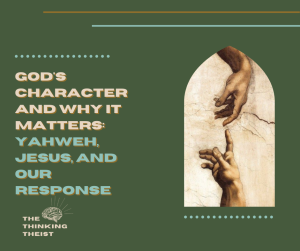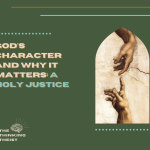
I am a firm believer that when we fully understand God’s Character and realize just how unlike God we are, then we are required to respond. Perhaps it is important to note that our response can be positive or negative.
When someone recognizes God’s holiness, love, grace, forgiveness, wrath, and justice, they can either:
- Turn away from God, live apathetically towards Him, seek their own will over His, and/or pound their fist until he/she fully gets his or her way in eternal separation from Him
or
- Fall on his or her face in worship, seeking “to offer their life as a living sacrifice, Holy and pleasing to God.” -Romans 12:1
To the Bible
To conclude this series, I want to dive into these 2 possible responses. First, let’s revisit the text that we have been diving into, one last time:
‘The Lord passed in front of Moses, calling out,
“Yahweh! The Lord!
The God of compassion and mercy! I am slow to anger and filled with unfailing love and faithfulness.
I lavish unfailing love to a thousand generations. I forgive iniquity, rebellion, and sin. But I do not excuse the guilty.
I lay the sins of the parents upon their children and grandchildren;
the entire family is affected— even children in the third and fourth generations.”
Moses immediately threw himself to the ground and worshiped. And he said, “O Lord, if it is true that I have found favor with you, then please travel with us. Yes, this is a stubborn and rebellious people, but please forgive our iniquity and our sins. Claim us as your own special possession.” ‘
-Exodus 34:6-9
What Do We See?
In previous articles, we dove into God’s compassion, mercy, and forgiveness. And we also discussed his patience and justice as seen through patterns in the world and by the cross of Jesus. Now, let’s take a brief look at the end of this passage. How did Moses respond to Yahweh and His glory? Broken down, his response looks like this:
- He fell to the ground and worshiped
- He asked God to travel with him and be at his side
- He asked for forgiveness for sins
- He asked Him to take Israel as His possession
Moses and Worship
First, I want to take a look at how Moses threw himself forward onto the ground and worshiped. Is this an appropriate response?
I remember going on a road trip with my mom. We drove to South Dakota, made our way back down to Utah and Arizona, and drove through the desert sands to reach the Grand Canyon. We drove up and up and up to the visitor’s area. When we got out of the car, it was hot and gross. We were frustrated because we were a little hungry and we wanted to see the canyon before nightfall. Finally after days of travel, it was time to see the Canyon; a staple for United States road-tripping everywhere. We’ve seen pictures, I’ve studied it in Middle School, and we both have been wanting to go for years.
When we approach the first viewing spot for visitors… well, I’ll let you see for yourself:

Breathtaking, isn’t it?
As the day went on, the sun started to fall into the west, and the sky turned orange. The canyon began to glow; a haze filled the valley. Check it out:

Undeniable Beauty
The objective beauty that we (my mom and I) were witnesses to in that moment left us stricken with awe. The idea that all of this came into being from nothing, and that there was no divine hand at play was lost on me. At the sight of creation, I began to tear up, and began to worship the Lord.
If moments of beauty, awe, and humility drive us to emotion and wonder. If earthly visits to a National Park can inspire such reverence, imagine being in the presence of the One who sets the standard for beauty in the first place. Imagine being in the presence of someone so holy that we shouldn’t even be able to be in His presence.
This is the situation that Moses realized He was in. All He could do was fall down and worship.
And it’s not just Moses.
Revering the Holy
When we realize God’s grandeur and holiness, and that evil is an abomination to Him, we begin to look inward and see how unworthy we are in His sight. Take this interaction between Isaiah and Yahweh as an example:
“Their voices shook the Temple to its foundations, and the entire building was filled with smoke.
Then I said, ‘It’s all over! I am doomed, for I am a sinful man. I have filthy lips, and I live among a people with filthy lips. Yet I have seen the King, the Lord of Heaven’s Armies.’
Then one of the seraphim flew to me with a burning coal he had taken from the altar with a pair of tongs. He touched my lips with it and said, ‘See, this coal has touched your lips. Now your guilt is removed, and your sins are forgiven.’”
–Isaiah 6:4-7
Isaiah understood who The Lord is and thought himself as a doomed man. Why?
Sin
Sin and the Holy
Evil is completely other from God. It is completely counter to who God is. Thus, God presenting Himself to Isaiah causes him to flip out. Can we blame him?
But let me turn your attention to God’s response to Isaiah. Isaiah believes he is doomed. He believes that because of sinfulness, he is disqualified from being in God’s presence, let alone serving Him.
Yet God doesn’t smite him. God does not look at disgust upon Isaiah nor does He kick him out of the temple court. Instead, the Lord cleanses Isaiah and in doing so removed his guilt and forgave his sin. Do you see the other traits of God stealing the show a little bit?
Our worship of the Lord and our right response to His splendor and majesty, is met with grace, mercy, and forgiveness. It is our rebellion, and raising of our fists that brings judgment.
Holy Jesus and Sin
As I’ve said before, our view of God should affect our view of everything. Consequently, if Jesus is God incarnate, then our view of Jesus should (and does) affect everything in our lives. So, does Jesus demonstrate this? Let me show you a couple of instances where this occurs. In Matthew 17, we see an instance where Jesus shows all of His glory to the disciples:
‘Six days later Jesus took Peter and the two brothers, James and John, and led them up a high mountain to be alone. As the men watched, Jesus’ appearance was transformed so that his face shone like the sun, and his clothes became as white as light.
Suddenly, Moses and Elijah appeared and began talking with Jesus. Peter exclaimed, “Lord, it’s wonderful for us to be here! If you want, I’ll make three shelters as memorials —one for you, one for Moses, and one for Elijah.”
But even as he spoke, a bright cloud overshadowed them, and a voice from the cloud said, “This is my dearly loved Son, who brings me great joy. Listen to him.” The disciples were terrified and fell face down on the ground. Then Jesus came over and touched them. “Get up,” he said. “Don’t be afraid.” ‘
-Matthew 17:1-7
What Do We See?
Jesus takes Peter, James, and John and shows them His glory. He is covered with light as His divine nature is shown through His incarnate body. He begins speaking with Moses, and Elijah. And then something happens.
The voice of Yahweh from a bright cloud claims Jesus as His Son. Why is this a big deal? This Sonship is that of an heir to a throne. This is one of the times that Jesus shows Himself as a divine figurehead. In my mind, a picture of the Son of Man on the clouds enters into the picture (Daniel 7); Jesus is the one who is to sit at the right hand of the Father.
At this, the disciples, just as Moses and Isaiah. Fall down and worship. They are terrified. Why? Because they realized that they are in the presence of the Holy One. They are in the presence of God the Father and God the Son.
How does Jesus respond to their reverence?
He tells them not to be afraid and to get up.
Jesus’ Trial and Holiness
There are moments when God’s Holiness causes more anger, rebellion, and disdain among unbelievers. One example that comes to mind is the trial of Jesus before the Sanhedrin. At the end of Mark’s account of Jesus’ life, we see a series of accusations and questions asked of Jesus before a Temple Council. Check out this account:
“Then the high priest stood up before the others and asked Jesus, ‘Well, aren’t you going to answer these charges? What do you have to say for yourself?’
But Jesus was silent and made no reply. Then the high priest asked him, ‘Are you the Messiah, the Son of the Blessed One?’
Jesus said, ‘I Am. And you will see the Son of Man seated in the place of power at God’s right hand and coming on the clouds of heaven.’
Then the high priest tore his clothing to show his horror and said,
‘Why do we need other witnesses? You have all heard his blasphemy. What is your verdict?’ ‘Guilty!’ they all cried. ‘He deserves to die!’”
Mark 14:60-64
Who Did Jesus Think He Was?
The question of who Jesus thought that He was is a point of contention among many faith communities. In the Quran, Muslims paint Jesus as just a mischaracterized man who was a prophet of Allah; someone who never claimed to be God or divine. Some Hindus believe that Jesus was a divine manifestation of Brahman and can be placed in the pantheon of their gods. Surprisingly, some non-believers do not even believe that Jesus existed (a topic for a later series that is coming soon)!
Yet what we see here, in a Jewish Council, is a Jewish man named Jesus associating Himself with the exclusive Jewish God of the Universe, Yahweh.
He not only associates with Him, but claims to be Him!
The Meaning of “I AM”
When Jesus responds “I AM” to the question of Sanhedrin, He is not simply saying “Yes I am the Messiah”; He is echoing the name of Yahweh Himself in Exodus 3:14 “I AM WHO I AM”. Jesus is saying “The Lord” is among you. He is saying that He is the One that Israel has been waiting for their entire existence, the Messiah.
At this response the council goes into a frenzy with one of the chief priests even tearing his clothes in mourning and astonishment! This led to a clear verdict: Guilty. Jesus was declared guilty of blasphemy, a charge of claiming to be God. And was later sentenced to death by Pilate the governor of Judea.
Jesus is the Son of Man, the Son of God, and claims to be Yahweh Himself in the earliest Gospel written.
What Do We See?
What we see in the response by the Sanhedrin is one of fury and anger at someone claiming to be Yahweh. If anyone has studied Hebrew culture, this shouldn’t be surprising. What is a central theme throughout the Gospel accounts (the historical biographies of the last 3 years of Jesus’ life) is the constant “missing the point” of the Pharisees, the Sanhedrin, the Herodians, and even the disciples at times. Jesus has given evidence throughout His life showing that He is in fact who He claims to be. Those that conducted the trial were without excuse.
And so for the person now reading this. The question comes to you:
Who do you say Jesus is and why does it matter?
Questions to Consider
If Jesus is God in the flesh, if He is coming back to judge the living and the dead, and if He is truly the Lord of life, then why wouldn’t we submit to His will all over our lives?
If Jesus died on a cross and rose from the dead, showing His compassion, wrath, forgiveness, patience, justice, and mercy toward you, so that by believing in Him you would be saved for eternity, would you take the offer?
If Jesus is who He claims to be, would you follow Him?
Your answer will affect everything.













